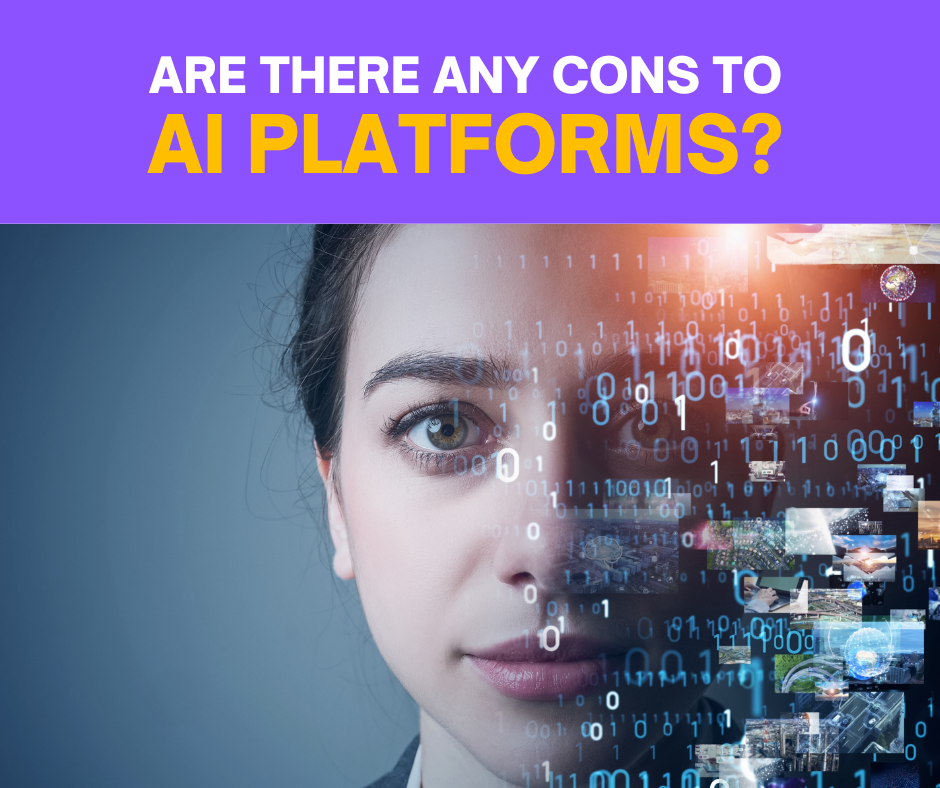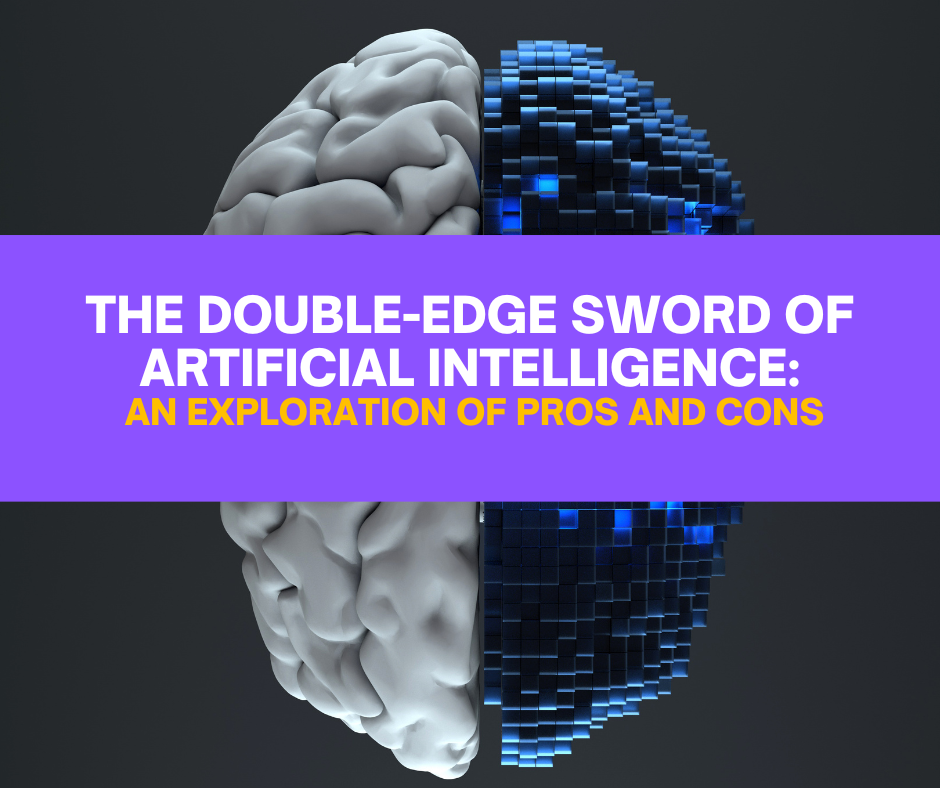Artificial Intelligence (AI) is rapidly becoming more prevalent in our society. It’s relied upon as a platform to store, analyze, and synthesize large amounts of data. While there are many benefits to using AI, such as improving efficiency, expanding knowledge, and revolutionizing industries, it’s important to consider the potential downsides of over-reliance on these systems. This article will carefully examine the advantages and disadvantages of trusting AI platforms, and express concerns about the accuracy of information, decision-making, and the impact on human critical thinking.
While there is no concrete evidence of companies facing exposure of their intellectual property on AI platforms, data breaches leading to the divulgence of confidential information have been reported. These breaches are generally caused by inadequate security protocols or human errors, rather than the use of AI platforms.
It is crucial to note that adopting AI platforms for managing or processing data does not automatically result in relinquishing a company’s intellectual property rights. It is the responsibility of the organization to meticulously choose secure AI platforms and establish rigorous data protection measures, such as data encryption, access controls, and frequent security audits.
Pros of AI Platforms
Undoubtedly, AI technology has greatly improved efficiency and decision-making. With the ability to handle and analyze massive amounts of data at lightning speeds, we can now make better-informed decisions faster and more accurately than ever before.
With AI technology, we are able to gain a more personalized understanding of the world around us. We have access to an abundance of information and can analyze complex patterns with ease. This allows us to learn and grow with greater efficiency and accuracy.
AI technology is a powerful tool that can significantly boost productivity, fuel economic growth, and establish novel industries. Many sectors stand to reap significant rewards by integrating AI platforms into their operations.
The implementation of AI platforms has the capability to transform numerous industries by boosting productivity, refining judgement, and exploring innovative prospects. The incorporation of AI platforms can provide substantial advantages to sectors such as:
Healthcare: AI can assist in diagnosing diseases more accurately, predicting patient outcomes, and personalizing treatment plans. AI-powered tools can also help analyze medical images, develop new drugs, and optimize hospital workflows.
Space exploration: AI platforms can process vast amounts of data from space missions, enabling scientists to analyze complex patterns, detect anomalies, and make better-informed decisions. AI can also help develop autonomous spacecraft and rovers capable of conducting missions with minimal human intervention.
Research and development: AI can accelerate scientific research by automating data analysis, identifying patterns, and generating hypotheses. This can lead to faster discoveries and advancements in fields like physics, chemistry, biology, and materials science.
Manufacturing: AI platforms can optimize production processes, improve supply chain management, and enhance quality control. Predictive maintenance, powered by AI, can minimize downtime and reduce costs by identifying potential equipment failures before they occur.
Agriculture: AI can help farmers make data-driven decisions about crop management, pest control, and irrigation. AI-powered drones and autonomous machinery can assist with precision agriculture techniques, leading to increased crop yields and sustainability.
Financial services: AI can improve fraud detection, risk assessment, and investment management by analyzing large datasets and identifying patterns. AI-powered chatbots can also enhance customer service by providing personalized financial advice.
Transportation: AI platforms can optimize traffic management, develop autonomous vehicles, and improve public transportation systems. AI can also help with route planning, reducing fuel consumption and emissions.
Retail: AI can enhance customer experiences by offering personalized recommendations, improving inventory management, and streamlining logistics. AI-powered chatbots can also assist with customer service and support.
Energy: AI can optimize energy production and consumption by analyzing patterns in supply and demand, predicting equipment failures, and enhancing the efficiency of renewable energy sources.
Education: AI can provide personalized learning experiences, identifying gaps in knowledge, and recommending tailored educational content. AI can also help educators monitor student performance and provide targeted support.
These examples are just the tip of the iceberg when it comes to the potential applications of AI platforms across various industries. As AI continues to advance and mature, its impact on different sectors will only grow, driving innovation and offering new solutions to complex challenges.
Cons of AI Platforms

Dependence on AI-generated information: As we increasingly rely on AI platforms for information, there is a risk that we might accept AI-generated data as gospel and irrefutable without critically examining the sources or methods used to generate it.
Verifying AI-generated insights is a challenging task due to the abundance of data. This challenge can result in misguided decisions in personal, business, and government contexts, ultimately jeopardizing the accuracy of cross-checking information.
Relying too heavily on AI platforms can erode critical thinking skills, as people may unquestioningly accept the information and decisions provided by AI. Therefore, it is essential to remain vigilant and apply critical thinking skills when using these platforms.
As AI becomes more deeply embedded in our daily lives, it is vital to consider the potential consequences of our dependence on these platforms. We must ask ourselves whether AI-generated information can always be regarded as reliable and whether we might eventually reach a point where the sheer volume of data cannot be cross-checked. This raises concerns about the potential for faulty decisions in personal lives, businesses, and government.
Moreover, we must consider the impact of AI on our cognitive abilities. Will human critical thinking diminish as we increasingly rely on AI to make decisions? Can we balance leveraging AI’s benefits and preserving our ability to think critically and independently?
AI undoubtedly offers potential benefits and drawbacks in various industries. While it can undoubtedly enhance progress and productivity, it may also lead to the replacement of jobs that require less complex decision-making. Thus, it is crucial to weigh these impacts and strive for a balance between the advantages and disadvantages to ensure a prosperous and equitable future.
Healthcare: Diagnostic and support roles, such as radiologists and laboratory technicians, could be impacted as AI becomes more proficient in analyzing medical images and automating laboratory tests.
Manufacturing: Assembly line workers and machine operators might face job losses as AI-powered robots and automation systems take over repetitive tasks and optimize production processes.
Agriculture: Farmworkers could be displaced by autonomous machinery and AI-driven systems that perform tasks such as planting, harvesting, and pest control.
Financial services: Bank tellers, loan officers, and other roles that involve routine tasks might be replaced by AI-powered chatbots and automated systems that can provide financial advice and process transactions.
Transportation: Drivers of commercial vehicles, taxis, and delivery services could lose their jobs as autonomous vehicles become more widespread and capable of navigating complex environments.
Retail: Cashiers and store clerks may face job losses as AI-powered self-checkout systems and inventory management solutions become more prevalent.
Energy: Jobs in power plants and energy distribution centers might be affected as AI-driven systems optimize energy production, consumption, and predictive maintenance.
Education: While it is less likely that teachers will be entirely replaced by AI, some administrative and support roles in education could be automated, such as grading, data entry, and scheduling.
Customer service: Call center agents and customer support representatives might be replaced by AI-powered chatbots that can handle routine inquiries and provide personalized support.
It is important to note that while AI has the potential to displace jobs, it can also create new opportunities and roles that did not exist before.
As AI transforms industries, there will be a growing need for skilled workers who can develop, maintain, and work alongside AI systems. This could include data scientists, AI engineers, and technicians who specialize in maintaining AI-driven machinery and robotics.
To mitigate the negative impact of job losses, it is crucial for governments, educational institutions, and businesses to invest in retraining and upskilling programs that help workers transition to new roles in an AI-driven economy. Emphasizing lifelong learning and fostering a culture of adaptability will be key to ensuring that the workforce can navigate the challenges posed by AI and continue to thrive in the evolving job market.
In summary, AI platforms offer the potential to enhance efficiency, increase knowledge, and drive innovation. Nonetheless, it is vital to approach the integration of AI with a skeptical mindset and take into account the possible negative consequences of excessive reliance on these systems. By cultivating a culture of critical thinking, we can capitalize on the advantages of AI while mitigating its risks, leading to a harmonious coexistence between humans and AI, with each entity complementing and enhancing the other’s abilities.
Schedule a discovery call with us today to better navigate the AI space.
Full-Stack IT Services: Infinavate Consultancy Services has a 20 year history as a national, boutique and Certified Minority Owned IT Solutions and Consulting Firm. Our core business offerings include business process automation, digital transformation, and cybersecurity fortification.

“We asked for specific skill sets and we got it [from Infinavate]. We required a high degree of acumen that we had a hard time finding resources for.” – CSL Plasma

